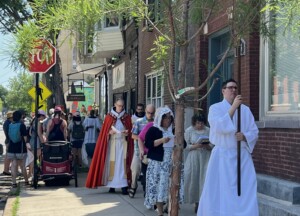Tonight, I would like to follow up on a topic that I spoke about during Chapter last week, and that is the priority of persons over rules. I asked Br. Anthony to look up some examples of this contrast in the Sayings of the Desert Fathers. Some of the examples I will use tonight are the ones he found.
It occurred to me that a major source of the appeal of the Desert Fathers as spiritual teachers is precisely that they refuse to formulate rules. In fact, they seem to be better known for finding all kinds of exceptions to rules. Here’s an example:
A directive was once issued at Scete: “Fast this week.” It came about that some brothers from Egypt visited Abba Moses and he cooked them a little gruel. Seeing the smoke, his neighbors told the clergy: “Here, Moses has broken the directive of the fathers and cooked himself some gruel.” “We ourselves will speak to him when he comes,” they said. When Saturday came round, the clergy, well aware of the great discipline of Abba Moses, said to him before the company: “Oh Abba Moses, you have broken men’s directive but fulfilled God’s.”
The priority of persons is often very explicitly taught by the Fathers. Here is a saying of Antony the Great:
Life and death depend on our neighbor: for if we win over our brother, we win over God, but if we offend our brother, we sin against Christ.
Here, I will note that we do not typically win someone over by quoting the rule book to him. This doesn’t mean that it isn’t sometimes an act of charity for someone to state the Church’s teaching clearly. Among the spiritual works of mercy are instructing the ignorant and admonishing the sinner. Saint Benedict clearly wants the abbot to intervene when a brother is acting disobediently or contrary to the community’s customs.
But notice that here, it depends in another way upon persons: the abbot is the one who determines when and how to intervene, and this can’t be predicted ahead of time by rules. Our current Abbot Visitor, Abbot Cuthbert, once quoted another abbot, I believe an abbot of Solesmes, saying that in a monastery there should be many strict rules, and many dispensations from those rules. But there are not rules for when to grant a dispensation. That depends on the abbot’s personal judgment.
The abbot according to Saint Benedict is a master of virtue. And we know that the virtuous action cannot be legislated ahead of time and out of context. I believe that Alasdair Maclntyre, in the book Dependent Rational Animals, has also demonstrated that we cannot learn virtue apart from the concrete situations that involve us in the lives of others, and involve them in our lives.
What this means in practice is that virtue can only be learned by faith. In other words, we learn the virtuous action by imitating the one who already possesses virtue, which means that we trust that person’s example, and we act without fully knowing what we are to learn by that action. And then, one hopes, through consenting to that action by an act of trust, observing the consequences of that action, and sympathetically observing how it affects others, we gain insight into what is truly virtuous.
So again, the Desert Fathers embody this principle very strictly. We have example after example of virtuous actions and the responses of the other monks, usually edified, but occasionally scandalized. Typically those who are scandalized are so either because they insist on a rule, or because they insist on the action fitting their understanding of the situation, rather than trusting in the example of a wiser monk.
